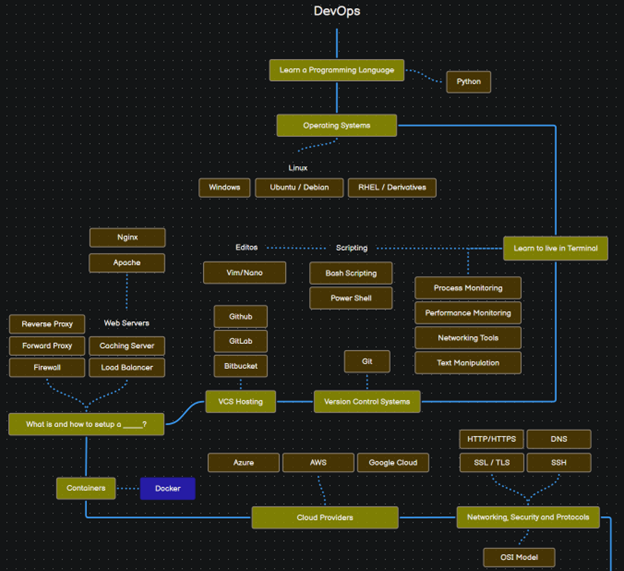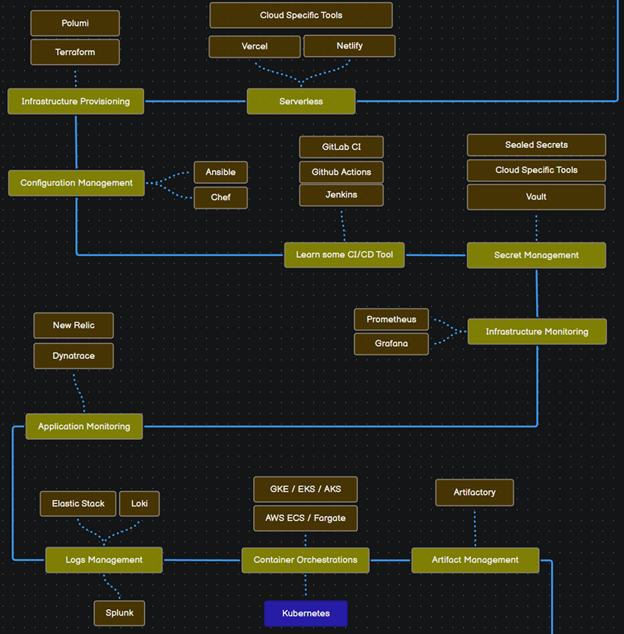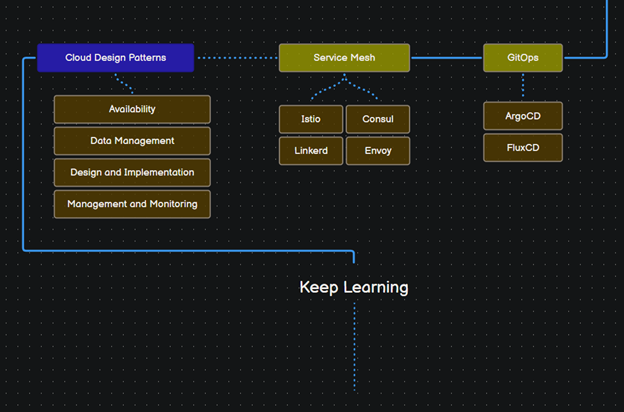DevOps and Cloud Computing have revolutionised the IT industry. Their emergence has led to unprecedented levels of efficiency, agility, and innovation.
DevOps, blending development and operations, enhances collaboration and automates processes, significantly reducing time-to-market for new software. Cloud Computing complements this by offering scalable, flexible, and cost-effective infrastructure, enabling businesses to adapt swiftly to market changes. Together, they drive digital transformation, which makes them indispensable in the modern IT landscape.
Before looking into the related roles and careers in these areas, let’s go over the fundamentals of DevOps and Cloud, which we introduced in the first part of this article. They represent a paradigm shift, focusing not just on tools and technologies, but also on processes, culture, and mindset.
These principles underline the successful implementation and management of DevOps and Cloud practices, ensuring efficiency, scalability, and continuous improvement in software development and deployment:
-
Continuous Integration and Continuous Delivery (CI/CD)
Automating the software build, test, and deployment processes to enable frequent, reliable releases.
-
Collaboration and communication
Encouraging open, ongoing collaboration between development, operations, and other stakeholders.
-
Infrastructure as Code (IaC)
Managing and provisioning infrastructure through code for consistency and efficiency.
-
Automated testing
Implementing extensive automated testing to ensure code quality and reduce manual effort.
-
Monitoring and logging
Continuously monitoring performance and maintaining detailed logs for proactive issue resolution and optimisation.
-
Security integration (DevSecOps)
Embedding security practices into the DevOps process.
-
Scalability and flexibility
Designing systems that can scale and adapt rapidly to changing needs, often enabled by cloud technologies.
-
Customer-centricity
Focusing on delivering value to the customer through functional, reliable, and fast software updates.
The demand of Cloud/DevOps-related roles
Over the years, the demand for DevOps and Cloud professionals has significantly increased. As more organisations adopt these technologies, the need for skilled experts who can navigate both areas have become critical.
This trend is not just temporary but a fundamental shift in how IT services are delivered and managed. Professionals skilled in these areas are in high demand and, therefore, benefit from premium salaries, reflecting their pivotal role in enabling businesses to stay competitive and innovative.
Now… what are the differences between Cloud, DevOps, SRE, and Platform Engineers?
In the complex landscape of modern IT roles, DevOps Engineer, Site Reliability Engineer, Cloud Engineer, and Platform Engineer positions often overlap but also have distinct responsibilities and focuses.
Here's a comparative analysis highlighting their differences and similarities:
DevOps Engineer
-
Focus: DevOps Engineers concentrate on improving the collaboration between software development and operations. They work towards automating the software deployment process, ensuring consistent and reliable software delivery.
-
Key responsibilities: Implementing CI/CD pipelines. Automating the software build, test, and deployment process. Bridging the gap between development and operations teams.
-
Skills: Proficiency in automation tools (like Jenkins, Ansible), coding/scripting, and system administration.
Site Reliability Engineer (SRE)
-
Focus: SREs focus on creating highly reliable and scalable software systems. Originating at Google, the role is a blend of operations with a strong emphasis on coding and automation.
-
Key responsibilities: Ensuring system reliability, scalability, and performance. Implementing automation for system monitoring and alerting. Balancing service reliability with the pace of new feature releases.
-
Skills: Deep understanding of coding/scripting, system administration, and a strong foundation in software engineering principles.
Cloud Engineer
-
Focus: Cloud Engineers specialise in cloud-based computing solutions, including infrastructure, platform, and software as services.
-
Key responsibilities: Designing and managing cloud infrastructure and services. Implementing and managing cloud security measures. Optimising cloud resources for efficiency and cost-effectiveness.
-
Skills: Expertise in cloud platforms (like AWS, Azure, Google Cloud Platform), cloud architecture, and network/security management in the cloud.
Platform Engineer
-
Focus: Platform Engineers work on developing and maintaining the software platforms that support software deployment and operations.
-
Key responsibilities: Building and maintaining internal tools and platforms. Ensuring platform scalability and efficiency. Integrating various components of the software delivery pipeline.
-
Skills: Knowledge of platform-specific technologies, container orchestration (like Kubernetes), and system integration.
Despite their differences, these roles share several common aspects:
-
Automation: All roles emphasise automation to improve efficiency and consistency.
-
Collaboration: Each role involves a degree of collaboration with other IT and development teams.
-
Continuous improvement: A shared philosophy of continuous improvement and optimisation is prevalent in all these roles.
-
Technical proficiency: A strong foundation in coding, system administration, and understanding of modern IT infrastructure is crucial.
The roadmap
Now that the main concepts, the history, and roles of DevOps are out of the way, let’s take a look at the steps needed to achieve these goals.
Whether you come from area of Operations or Software Development, the three fundamental things you need are…
…Linux, Bash, and Containers
Why? Well, Linux is a free, open-source operating system and the number one for Software Development. In this industry, open-source is dominant, meaning Linux has a huge impact and a protagonist role.
As for Bash, in my experience, no other tool has been more versatile for me than bash script, which is a fast and reliable way to automate daily tasks. Bash is the tool you definitely need to master if you want to become DevOps, SRE, Cloud or Platform Engineer.
When it comes to Containers, they have become a fundamental technology for deploying, managing, and scaling applications efficiently and reliably, so you will get resource efficiency, isolation, and secure environments. It’s the core piece of microservices architecture and it has easy and mainly native integration with modern DevOps practices and tools, with a big community and ecosystem.
So those are the main topics that you will need to know if you want to go any further. Is that enough? No, but for sure it’s a starting point and it’s a good way to land a job as DevOps, SRE, Cloud, or Platform Engineer.
New technologies emerge every day, so you can find bigger roadmaps, but there’s no need to be overwhelmed. One thing I’ve learned in my career is to go for the 80/20 rule, meaning if you start by chasing 80% of the knowledge, you are on a good track. In my experience, it’s good enough to have a macro knowledge of each technology and take it from there.
Below you'll find a customised roadmap tailored for those embarking on a DevOps career. Drawing inspiration from the comprehensive roadmap available here, I’ve streamlined the content to focus on the essential concepts, technologies, protocols, and tools necessary in the industry today.
This condensed version is designed to provide you with a clear and updated guide, helping you to quickly grasp the fundamentals and start building your expertise in DevOps.



Conclusion
The DevOps, Cloud, SRE and Platform Engineer roles require knowledge of a lot of tools, concepts, and technologies, but I would say that everybody should start with the beginning – and the three keywords for that are Linux, Bash, and Containers. Then, the rest of the technologies you can learn on-demand.
For example, you might learn all the functionalities and features of a Cloud provider such as Amazon Web Services (AWS), but in the end you’ll need to use Linux. Maybe you’ll also need to automate tasks and with the baseline knowledge of Containers that you have, you can learn a Container Orchestration Tool, such as Kubernetes, that will provide you more opportunities to build, test and deploy applications in different ecosystems.
My last piece of advice is just to keep learning.

